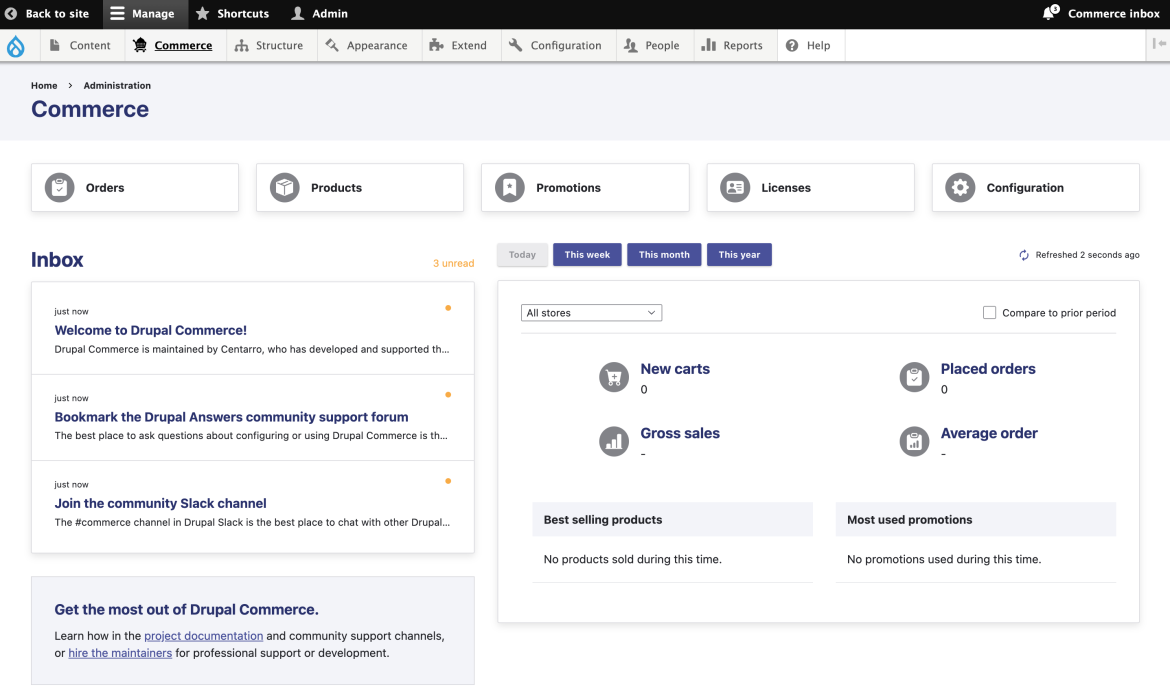 Support for Drupal 7 is ending on 5 January 2025—it’s time to migrate to Drupal 10! Learn about the many benefits of Drupal 10 and find migration tools in our resource center.
Support for Drupal 7 is ending on 5 January 2025—it’s time to migrate to Drupal 10! Learn about the many benefits of Drupal 10 and find migration tools in our resource center.Getting Started with Gutenberg (Block Editor) in Drupal (2024)
The Gutenberg Editor is a powerful page building tool for Drupal that utilizes a block building system to create and edit content.
This comprehensive guide walks you through each step of setting up and using the Gutenberg Editor.
From downloading and installing the Gutenberg module, to enabling it on your content types, and finally using it to create your content using blocks, this guide has you covered.
To get the most out of this guide, follow the video above.
Accessibility Elements, Part 5: Captions, Subtitles, Transcripts, and Audio Descriptions in Drupal
Multimedia content, such as engaging videos, insightful podcasts, and vibrant images, is meant to captivate, inform, and entertain website users. However, while creating an immersive world of multimedia experiences, it’s necessary to be mindful of the people with a wide range of impairments who need alternative ways to perceive the content.
Real-time: Symfony Messenger Consume command and prioritised messages
The greatest advantage of Symfony Messenger is arguably the ability to send and process messages in a different thread almost immediately. This post covers the worker that powers this functionality.
by daniel.phin / 11 January 2024This post is part 3 in a series about Symfony Messenger.
Essential Drupal Modules that Help you Prevent Spam
DrupalCon 2024 - How to Convince Your Boss (Sample Letter Enclosed)
DrupalCon 2024 is approaching soon, and you can’t wait to head to vibrant Portland. If this is you, you also must be stressed about persuading your boss to invest in your attendance at the Drupal event of the year. But don’t worry, we’ve got you covered! This article is your go-to resource, where you’ll find all the ammo you need to make your case. Let’s get started!
But First, Are You Convinced About Attending DrupalCon?
Naturally, your organization has various factors to weigh, with the primary concern being whether sending you to DrupalCon Portland is worth their investment. But the pivotal question is the value you see in it. Explore our list of strong reasons to attend DrupalCon 2024.
Commerce Core 2.37 release adds a new store dashboard
As we approached the end of 2023, we knew we needed at least one more release of Commerce Core to update EU VAT rates for 2024. We also realized it had been several months since we packaged a core release due to client obligations, so we thought closing the year out strong with a feature packed release on New Year's Eve would help us build momentum for the new year.
When we plan a new release, we first review the backlog of open issues that we know need to be addressed. These include minor feature improvements, compatibility updates, and bug reports. We also have long term objectives related to improving store administration and engaging merchants that we saw an opportunity to advance. This December, the time was right for us to land a store dashboard. 🥳

Pictured above, the store dashboard is designed to give merchants insight into their store's performance and direction for getting more out of Drupal Commerce. It offers fast access to management interfaces, embeds sales metrics and summary reports, and displays a feed of project updates through a "Commerce inbox" modeled on the Announcements module recently added to Drupal core.
Read moreSymfony Messenger’s message and message handlers and a comparison with @QueueWorker
This post covers Symfony Messenger’s message and message handlers, which are the day to day code developers using features of Symfony Messenger typically will be working on.
by daniel.phin / 10 January 2024This post is part 2 in a series about Symfony Messenger.
- Introducing Symfony Messenger integrations with Drupal
- Symfony Messenger’ message and message handlers, and comparison with @QueueWorker
- Real-time: Symfony Messenger’ Consume command and prioritised messages
- Automatic message scheduling and replacing hook_cron
- Adding real-time processing to QueueWorker plugins
- Making Symfony Mailer asynchronous: integration with Symfony Messenger
- Displaying notifications when Symfony Messenger messages are processed
- Future of Symfony Messenger in Drupal
The Symfony Messenger integration with Drupal provided by the SM project is the only requirement for the following examples.
The Profound Impact of Mentorship and Guidance
Dear Readers,
Have you ever felt the transformative power of a teacher's or mentor's encouragement? Anatole France, the French poet and journalist, once encapsulated this influence by saying,
"Nine-tenths of education is encouragement."
It's astonishing how teachers can nurture love or sow seeds of positivity, potentially steering an entire future. When a child moves beyond their family circle, teachers often step into a pivotal role. Their impact isn't confined to imparting knowledge; it extends to shaping perspectives, igniting passions, and defining life paths.
Just as many attribute their accomplishments to teachers who unearthed their hidden talents guiding their paths, the Drupal community thrives on mentors who play a pivotal role. Like educators, these mentors guide newcomers, share their expertise, and foster an environment conducive to growth within the Drupal ecosystem. They serve as pillars, offering invaluable guidance and insights enriching the community with their depth of knowledge and experience.
Unraveling the ETL Process - Transform
In the second episode of our three-part series on the ETL Migration process, we delve into the most involved stage of Drupal migration: Transformation. This episode features insights from Tag1 Consulting’s experts, including Mike Ryan, co-creator of Drupal Migrate, and notable contributor Benji Fisher. They analyze the Transformation phase in the ETL process, specifically examining Drupal’s unique “row-by-row” approach, and the discussion session revolves around the advantages and challenges of this method, with a strong emphasis on optimizing performance within the transformation pipeline. The episode is a treasure trove for those considering or currently working on Drupal migrations, as it steps into the technical realm while touching on the practical aspects of transforming data during a migration. Benji expresses his fascination with this particular stage, describing it as a playground for innovation and detailing the intricacies that make it the heart of the migration process. This discussion is essential for developers and IT professionals seeking to understand or undertake large-scale Drupal migrations. Part 1 | Part 2 | Part 3 - Coming soon! Please let us know if you have specific migration-related topics you'd like to see us cover. Or, reach out and let us know if we...
Read more janez Tue, 01/09/2024 - 07:33Layout Builder: A Drupal module that makes working with content easy
The advantages of Drupal CMS always include its friendliness to users who cannot write code. In most cases, these users are content managers. How can you give more power to the content manager of your Drupal website? Add the Layout Builder module that makes building web pages as easy as putting Lego bricks together.

Why Consider Drupal as Your Restaurant CMS Choice in 2024?

The restaurant sector has faced challenges amidst economic downturns, prompting a search for recovery through enhanced business agility. In fact, a staggering 71% of food establishments acknowledge the central role of digital transformation in achieving this objective.
In response to the growing influx of restaurants into the online domain, the demand for an efficient Restaurant CMS has become increasingly evident. A well-suited Restaurant website CMS, such as Drupal, proves instrumental in optimizing business operations.
What Makes Drupal the Right Choice for Restaurants?Drupal has over 20 years of experience in managing restaurant content and has become the top choice for many big companies and restaurants.
Did you know?
Around 89.2% of users believe that Drupal will become even more popular among different types of businesses in the next three years, not just in the restaurant industry.
This means the demand for a Sports CMS and an Education CMS will also increase.
How To Use The Power of Cron Jobs for Task Automation in Drupal
Displaying notifications when Messages for Symfony Messenger are processed
A trio of modules provide a unique experience for sites utilising SM and Symfony Messenger messages: Common Stamps, Pusher Mini, and Toasty. This combination ultimately shows UI toasts in the browser when Symfony messages relevant to the user are processed.
by daniel.phin / 9 January 2024This post is part 7 in a series about Symfony Messenger.
Introducing Symfony Messenger integrations with Drupal
Part one in a series of posts introducing Symfony Messenger, its ecosystem, and unique Drupal integrations to Drupal developers.
by daniel.phin / 9 January 2024The SM project brings Symfony Messenger and its ecosystem together with Drupal.
Symfony Messenger is a powerful alternative to Drupal’s @QueueWorker, enabling real-time or precise execution of scheduled tasks. It’s also a viable replacement for hook_cron enabling you to schedule dispatch and processing of messages according to crontab rules, again in real-time, rather than waiting for server-invoked or request-termination cron.
Messenger can be used as a user-friendly alternative to Batch API, as the user's browser is not blocked, while integrations such as Toasty can be programmed to notify when the last of a “batch” of messages completes, communicating to the user via user-interface toasts.
The Drupal integration includes additional niceties, such as intercepting legacy QueueWorkers for processing data through the Symfony Messenger bus, and end-user UI notifying a user when tasks relevant to them have been processed.
During this and the following series of posts, we’ll be exploring the benefits of real-time processing and user-friendly features that improve the overall experience and outputs.
Talking Drupal #432 - Portals & Community Websites
Today we are talking about Portals, Community Websites, and Drupal with guest Ron Northcutt. We’ll also cover Private Message as our module of the week.
For show notes visit: www.talkingDrupal.com/432
Drupal 7 security support will end - now is the time to plan a migration to Drupal 10!
 Nina Holzapfel
Project Manager
08.01.2024
Nina Holzapfel
Project Manager
08.01.2024

Drupal has been a robust choice for building and maintaining websites for decades. Like all other CMS systems, technological advancements and security requirements continually evolve at rapid speed and older software versions will be taken off the market.
In January 2025 Drupal 7 will finally reach its End of Life after 14 successful years and the necessity to transition to Drupal 10 has never been more critical.
Source: Drupal 7 End of Life | Drupal.org
What does Drupal 7 End of Life mean for your business?
This means the Drupal community and the official development team will stop providing support, including crucial security patches and updates. Without these updates, weaknesses in the system remain unaddressed, leaving websites vulnerable to dangerous cyber threats and data exploitation.
46,5% of all Drupal sites are still running on version 7
Setting Order Number before Payment Transaction
The Goal
In Drupal Commerce, carts do not have order numbers. Order numbers are not set until checkout completion, when the order is placed. If the order type has been configured with a number pattern, that pattern is used to generate the order number; otherwise the order entity ID is used. As a result, when a credit card payment is added during checkout, the cart/order may not have its final Order Number yet. For some payment gateways, this is fine--only the order entity ID is needed.
Payment by Purchase Order
The Goal
A Drupal Commerce website may want to offer the same payment terms provided to customers purchasing products offline. If up-front payment is not required, then we need to create an option for customers to complete checkout without providing payment. Additional information may need to be collected during checkout for the "payment on account" option in lieu of a traditional payment method. For our business needs, this additional information takes the form of a Purchase Order number entered by the customer.
Editing "Placed" Orders
The Goal
When a customer completes checkout on a Drupal Commerce website, the cart order is "placed." No additional changes can be made to the order by the customer. Administrative users, with access permissions, can typically edit these "placed" orders. However, significant changes like the addition/removal or an order item or an order item quantity/pricing change can be problematic. The changes can be made, but... afterwards, things like taxes, discounts, shipping charges, etc. may not be correct.
B2B Address
The Goal
When a store has customers that are businesses or institutional, the standard Address field properties and formatting may not align well with actual billing and shipping addresses. For example, a business address may not include the customer's first and last name as the first line; instead, an organizational name may be used. If a contact name is included, it may be an "Attention" line. Additionally, businesses may require a line with reference or purchase order number.